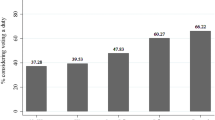Abstract
To justify reducing eligibility to vote to age 16 is to show how it serves as a means to enhanced democratic political engagement. Hence the question posed here is under what, if any, circumstances does reducing the voting age enhance political engagement. Political engagement is shorthand for the second, qualitative dimension of electoral participation. The first dimension is that of turnout, a purely quantitative expression. If our concern is limited to this dimension, then we should address making voting compulsory. But, in doing so, we risk bringing to the polls an additional number of less sophisticated voters. This is also the challenge posed to voting at 16 which the data shows, can also raise turnout. This chapter concentrates on the second, qualitative, dimension of political participation, which we can characterize as political engagement, a combination of political interest and knowledge. And here the relationship is far from clear. The conclusion is thus that the first priority must be to promote natural experiments to test, and potentially establish, this relationship.
Access this chapter
Tax calculation will be finalised at checkout
Purchases are for personal use only
Similar content being viewed by others
References
Bergh, J. (2013). Does voting rights affect the political maturity of 16- and 17-year olds? Findings from the 2011 Norwegian voting-age trial? Electoral Studies, 32(1), 90–100.
Bhatti, Y., Hansen, K., & Wass, H. (2012). The relationship between age and turnout: A roller-coaster ride. Electoral Studies, 31(3), 588–593.
Campbell, D., & Niemi, R. (2016). Testing civics: State-level civic education requirements and political knowledge. American Political Science Review, 110(3), 495–511. https://doi.org/10.1017/S0003055416000368.
Dassonneville, R., Quintelier, E., Hooghe, M., & Claes, E. (2012). The relation between civic education and political attitudes and behavior: A two-year panel study among Belgian late adolescents. Applied Developmental Science, 16(3), 1–11.
Fesnic, F. (2016). Can civic education make a difference for democracy? Hungary and Poland compared. Educational Review, 64(4), 966–978.
Fisher, S., Laurence, L., & Curtice, J. (2008). Disengaging voters: Do plurality systems discourage the less knowledgeable from voting? Electoral Studies, 27(1), 89–104.
Hooghe, M., & Stiers, D. (2017). Do reluctant voters vote less accurately? The effect of compulsory voting on party–voter congruence in Australia and Belgium. Australian Journal of Political Science, 52(1), 75–94.
Manning, N., & Edwards, K. (2014). Does civic education for young people increase political participation? A systematic review. Educational Review, 66(1), 22–45.
Milner, H. (2007). Political knowledge and participation among young Canadians and Americans (IRPP Working Paper).
Milner, H. (2010). The Internet generation. Hanover, NH: UPNE.
Neundorf, A., Niemi, R., & Smets, K. (2015). The compensation effect of civic education on political engagement: How civics classes make up for missing parental socialization. London: Royal Holloway, University of London.
Owen, D., & Soule, S. (2015, September 3–6). Civic education, political knowledge, and dimensions of political engagement. Presented at the Annual Meeting of the American Political Science Association, San Francisco, CA.
Pammett, J., & Leduc, L. (2003). Explaining the turnout decline in Canadian federal elections: A new survey of non-voters. Elections Canada.
Rosenqvist, O. (2016). Rising to the occasion? Youth political knowledge and the voting age (Working Paper). The Institute for Evaluation of Labour Market and Education Policy (IFAU) (2016/6).
Schulz, W., Carstens, R., Losito, B., & Fraillon, J. (2016). ICCS technical report. Amsterdam: IEA, 2018.
Torney-Purta, J., & Lopez, S. (2006). Developing citizenship competencies from kindergarden through grade 12: A background paper for policymakers and educators. Denver: Education Commission of States.
Author information
Authors and Affiliations
Corresponding author
Editor information
Editors and Affiliations
Rights and permissions
Copyright information
© 2020 The Author(s)
About this chapter
Cite this chapter
Milner, H. (2020). Political Knowledge, Civic Education and Voting at 16. In: Eichhorn, J., Bergh, J. (eds) Lowering the Voting Age to 16. Palgrave Studies in Young People and Politics. Palgrave Macmillan, Cham. https://doi.org/10.1007/978-3-030-32541-1_4
Download citation
DOI: https://doi.org/10.1007/978-3-030-32541-1_4
Published:
Publisher Name: Palgrave Macmillan, Cham
Print ISBN: 978-3-030-32540-4
Online ISBN: 978-3-030-32541-1
eBook Packages: Political Science and International StudiesPolitical Science and International Studies (R0)




